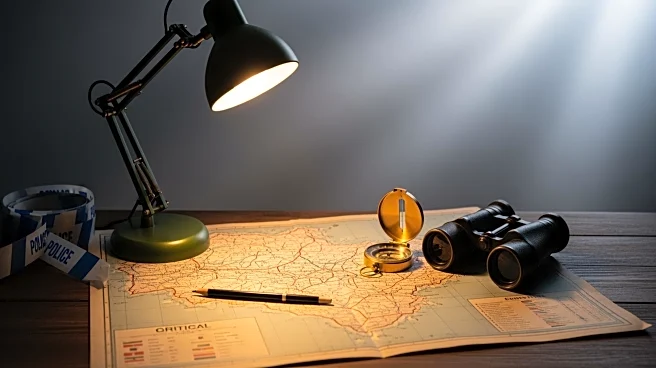What's Happening?
Dwight D. Eisenhower, born in Denison, Texas, and raised in Kansas, rose from a small-town background to become the Supreme Allied Commander in Europe during World War II and later the President of the United
States. Despite never seeing frontline combat during his 35-year military career, Eisenhower commanded the largest amphibious invasion in history, leading the Allies to victory in Europe. His career demonstrated that persistence, logistics, strategy, and leadership are crucial in warfare. Eisenhower's military journey began after graduating from West Point in 1915, where he trained infantrymen and coached college football during World War I. His ability to organize and train soldiers quickly earned him recognition from his superiors. Although he was set to deploy to France in 1918, the war ended before he could ship out. Eisenhower's interwar years were marked by strategic mentorships and frustrations with stalled promotions. He served under Brig. Gen. Fox Conner in Panama, learning strategic thinking and military history, and later worked for Gen. John Pershing, studying WWI battlefields. His experience in the Philippines under Gen. Douglas MacArthur honed his skills in managing leaders and coordinating multinational forces.
Why It's Important?
Eisenhower's leadership during World War II was pivotal in shaping the outcome of the conflict. His strategic vision and ability to coordinate Allied forces were instrumental in the success of operations such as the North Africa invasion and the D-Day landings. Eisenhower's lack of direct combat experience allowed him to approach warfare with a fresh perspective, unencumbered by the trench-warfare mindset of World War I. His leadership style emphasized logistics, diplomacy, and strategic planning, proving that these elements are as crucial as combat experience in military success. Eisenhower's career highlights the importance of adaptability and strategic thinking in leadership roles, influencing military and political strategies in the U.S. and beyond.
What's Next?
Eisenhower's legacy continues to influence military and political strategies. His presidency during the Cold War years further demonstrated his strategic acumen, navigating complex international tensions. The lessons from his leadership during World War II remain relevant in modern military and political contexts, emphasizing the importance of strategic planning and international cooperation. Future military leaders and policymakers can draw from Eisenhower's example, prioritizing logistics, diplomacy, and strategic alliances in addressing global challenges.
Beyond the Headlines
Eisenhower's career challenges the traditional notion that combat experience is essential for military leadership. His success underscores the value of strategic thinking, adaptability, and the ability to coordinate large-scale operations. The ethical and cultural dimensions of his leadership, including his emphasis on international cooperation and unity among Allied forces, continue to resonate in contemporary military and political discourse. Eisenhower's approach to leadership offers valuable insights into the complexities of warfare and governance, highlighting the importance of collaboration and strategic foresight.











